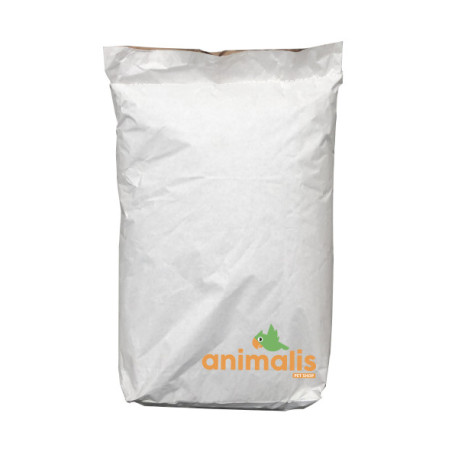- New






Reference: RADIS-25KG
Radish seeds have antioxidant, detoxifying, draining, and decongestant properties.
Radish seeds have antioxidant, detoxifying, draining, and decongestant properties.
The flaxseed consists of 40 to 45% oil and 25% protein. Flaxseed preserves very well. It contains, in particular, two fatty acids with similar names (both derived from the word "lin"), linolenic acid (an omega-3) and linoleic acid.
The seed is used in animal feed, particularly for laying hens for which an increase in the omega-3 content of the eggs is desired.
Due to these properties, this seed aids digestion.
High-quality seeds with high fat content
- With a high content of vitamin E, B9, B5, B6, B1, B2, B3, and vitamin K.
- It has antioxidant properties.
- Excellent energy contribution.
- Rich in calcium, potassium, magnesium, phosphorus, proteins, zinc, thiamine, pectin (cleanses the body).
Seed rich in protein, mainly present in pigeon mixes, appreciated by pigeons.
Aleppo pine seeds (large) for parakeets, parrots, crossbills... is a natural pine seed, a delight for your birds, this seed also has therapeutic virtues, it can be added to the seed mixture or in a separate feeder.
They have the property of binding to minerals such as calcium, iron and zinc and making them less bioavailable.
The canary seed is a grass, an annual plant up to 1m tall, the seeds being found in the inflorescences. These seeds represent a significant fraction of the majority of bird mixtures.
• Excellent for canaries, European and exotic birds, wavy parakeets and large parakeets.
• EXTRA canary seed has undergone extra cleaning and is of exceptional quality. Unique on the market!
Carrot seeds are very rich in vitamins with a high proportion of vitamin A and carotene, as well as vitamin B, calcium and valuable carbohydrates.
A 100% natural product that is mixed with breeding or with food; It doubles in size by adding water.
Carrots are very rich in vitamins with a high proportion of vitamin A and carotene, as well as vitamin B, calcium and valuable carbohydrates.
Oatmeal or peeled oats are used in the composition of the basic mixtures of canaries and hooked beaks especially during the breeding and feeding period.
Its protein level is quite low, but it is a seed rich in energy.
Crude protein: 13%
Fat: 8%
Carbohydrates: 68%
Phosphorus: 0.4%
Calcium: 0.09%
A 100% natural product that is mixed with breeding or with food; It doubles in size by adding water.
Carrots are very rich in vitamins with a high proportion of vitamin A and carotene, as well as vitamin B, calcium and valuable carbohydrates.
Hemp seeds are highly nutritious and contain more essential fatty acids (EFAs) than any other source and are in second place, after soya, for their richness in highly digestible proteins, of high biological value. They are particularly recommended during the breeding seasons in order to stimulate the reproductive instinct of birds.
Basil 1kg
Basil contains many antioxidants, is anti-inflammatory, and helps against stress. This does not mean that basil is considered a medicine. Dried basil is of course also different from fresh basil plants. But the fact remains: basil is good for health.

Radish seeds have antioxidant, detoxifying, draining, and decongestant properties.
